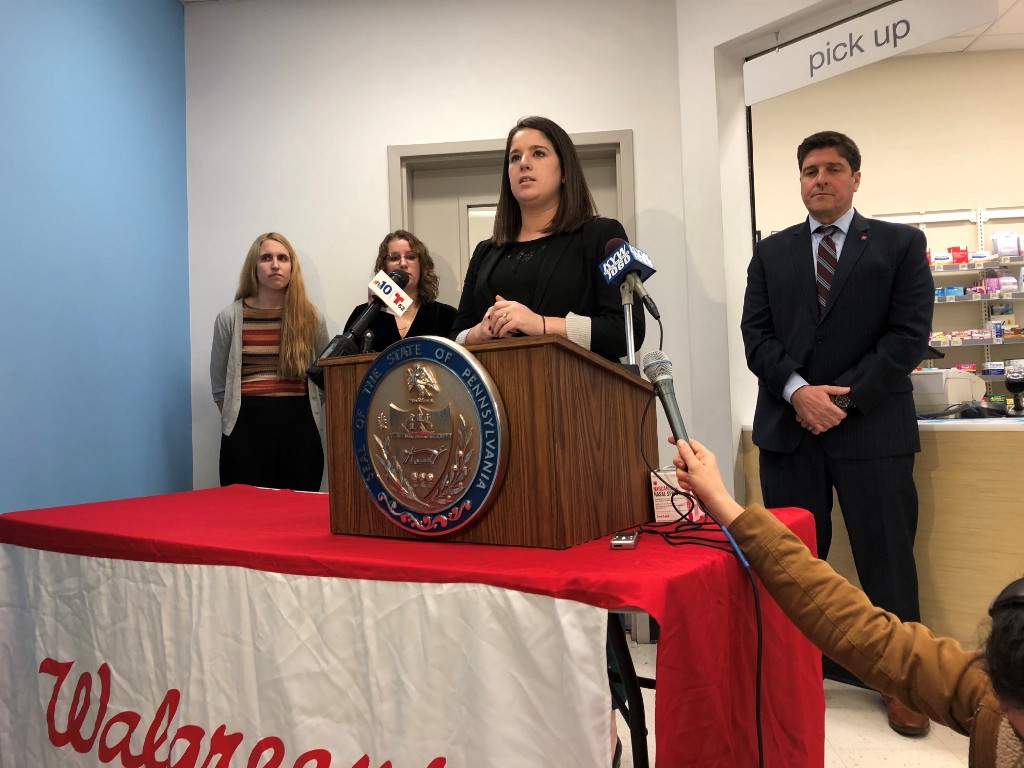The event was part of Stop Overdoses in PA: Get Help Now Week, a statewide initiative to get naloxone to Pennsylvanians and get help for residents suffering from the disease of opioid-use disorder.

Members from Pennsylvania Governor Wolf’s Administration and other local officials gathered last month at a Walgreens pharmacy in Port Richmond to highlight a new agreement with insurers to ensure that citizens can obtain the overdose reversal medication naloxone at their local pharmacy. The event was part of Stop Overdoses in PA: Get Help Now Week, a statewide initiative to get naloxone to Pennsylvanians and get help for residents suffering from the disease of opioid-use disorder.
“This crisis impacts every community in every part of Pennsylvania, and it is going to take a tremendous commitment from all of us — whether we are public officials, insurers, medical professions, pharmacists or citizens — to combat it, to save lives and help those who are suffering,” said Insurance Commissioner Jessica Altman. “I’m proud that my department is doing our part to ensure that the community has access to life-saving treatment.”
Altman, along Philadelphia Public Health Department Harm Reduction Coordinator Allison Herens, Walgreens Regional Healthcare Director Domenic DiPrimo and Representative from Philadelphia City Councilman Bobby Henon’s office Emma Wagner, held a press conference at the Walgreens at 1809 E. Allegheny Ave. to inform the community about its ability to access Naloxone at a local pharmacy.
“The councilman has made this is top priority in legislation,” Wagner stated at the press conference. “He is pushing for Narcan to be available in pharmacies throughout the city. In his own district he’s visited 22 pharmacies — not all of them carry naloxone currently — and he has and will continue to offer naloxone and overdose reversal trainings in his district this year.”
“Last year [Walgreens] began stocking Narcan, which is an FDA-approved nasal spray — it’s a form of naloxone — in all our drug stores nationwide,” said DiPrimo at the press conference. “We have worked state by state to allow for medication to be dispensed without requiring a prescription. Today, we can dispense naloxone in almost all states without requiring a prescription including right here in Pennsylvania.”
As part of its ongoing commitment to combat the opioid overdose crisis, the Wolf Administration recently reached an agreement with the state’s seven largest commercial insurers to remove pre-authorization for Medication-Assisted Treatment (MAT) for opioid addiction, and ensuring access to the life-saving overdose reversal medication Naloxone for anyone who seeks it. This agreement brings these insurers largely into alignment with what has already been implemented through the commonwealth’s Medicaid managed care plans. The agreement, however, does not apply to self-funded insurance plans.
The guidelines also provide that MAT will be covered at the lowest patient cost tier on the plan’s pharmacy benefit.
“These are key steps in making sure people who need help fighting an addiction, and for whom Medication-Assisted Treatment is deemed to be the best option, will now have access right away, without waiting for an insurance pre-authorization,” Altman said. “We want to ensure that individuals who need treatment can get the level of care they need, when they need it, without unnecessary barriers.”
Residents can go to a state health center or their local pharmacy to get the overdose reversal medication Naloxone. This medication reverses the effects of an opioid overdose and gives the patient a chance at recovery.
“We cannot get someone into treatment if they are dead,” Governor Wolf said, according to a press release. “Naloxone saves lives and we should all carry it because you never know when you will get the chance to help someone. This year alone, emergency medical services have saved more than 9,000 Pennsylvanians using Naloxone and transported 92 percent of them to the hospital for treatment.”
Since Governor Wolf first signed a heroin and opioid disaster declaration in January, 16 state agencies have continuously worked to fight the opioid epidemic and have made significant progress to help individuals and families dealing with this crisis. Some accomplishments include waiving birth certificate fees for individuals seeking treatment, using federal Medicaid funding in treatment facilities to provide more than 12,000 individuals access to medically necessary treatment, and providing career services to people who have been impacted by the opioid epidemic and plan to return to work
For more information on Pennsylvania’s response to the opioid crisis visit www.pa.gov/opioids.
